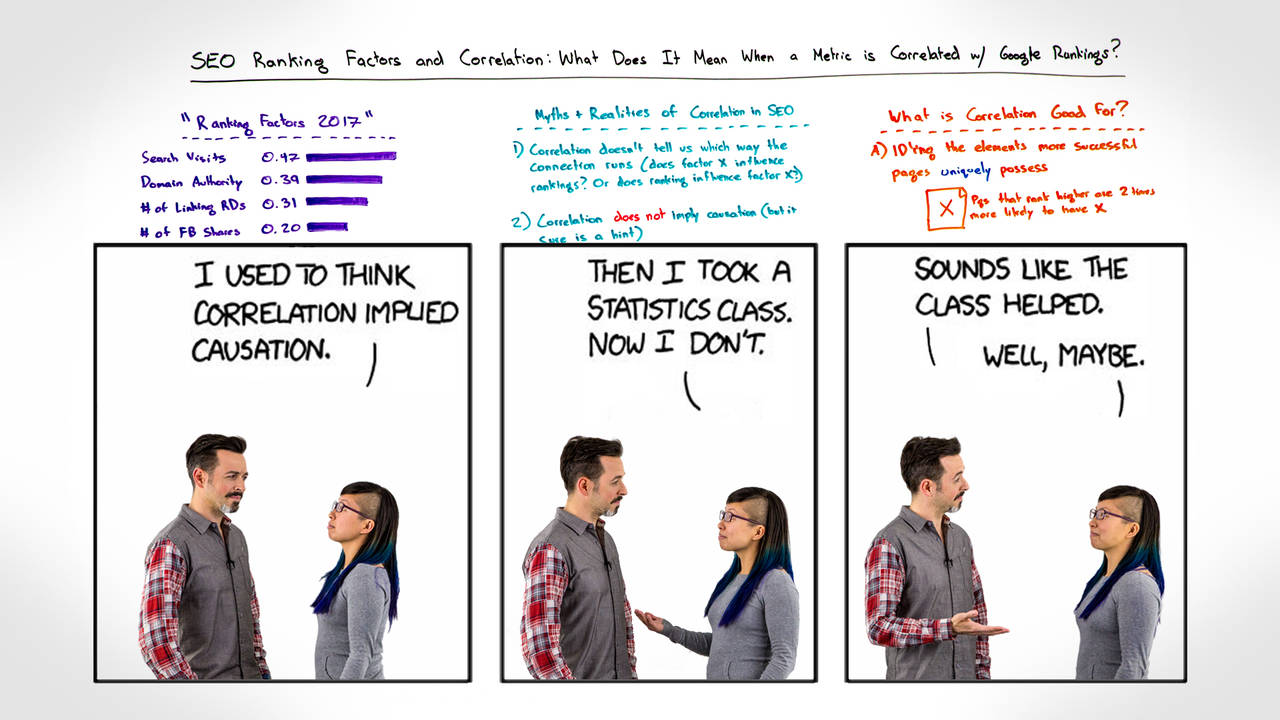This week we are chatting about SEO ranking factors and the challenge around understanding correlation, what correlation means when it comes to SEO factors. They're usually called something like ranking factors or ranking elements study or the 2017 ranking factors, and a number of companies put them out. These usually follow a pretty similar format, which is they take a large number of search results from Google, from a specific country or sometimes from multiple countries, and they'll say, "We analyzed 100,000 or 50,000 Google search results, and in our set of results, we looked at the following ranking factors to see how well correlated they were with higher rankings." I think it's probably that the correlation runs the other way around — the higher you rank in search results, the more visits on average you get from Google search. Could it be the case that search results that rank higher in Google oftentimes get people sharing them more on Facebook because they've been seen by more people who searched for them? What it proves to me is pages that are getting more Facebook shares tend to do a good bit better than pages that are not getting as many Facebook shares. We're not talking about Knowledge Graph or featured snippets or image results or video results or any of these other, the news boxes, the Twitter results, anything else that goes in there. So, for example, when we first did this study in I think it was 2005 that Moz ran its first one of these, maybe it was '07, we saw that keyword use in the title element was strongly correlated. E. Finding elements to test So if I see that large images embedded on a page that's already ranking on page 1 of search results has a 0.61 correlation with the image from that page ranking in the image results in the first few, wow, that's really interesting. Correlation in SEO, especially when it comes to ranking factors or ranking elements, can be very misleading.

In an industry where knowing exactly how to get ranked on Google is murky at best, SEO ranking factors studies can be incredibly alluring. But there’s danger in believing every correlation you read, and wisdom in looking at it with a critical eye. In this Whiteboard Friday, Rand covers the myths and realities of correlations, then shares a few smart ways to use and understand the data at hand.

CC
Off
English

Click on the whiteboard image above to open a high-resolution version in a new tab!
Video Transcription
Howdy, Moz fans, and welcome to another edition of Whiteboard Friday. This week we are chatting about SEO ranking factors and the challenge around understanding correlation, what correlation means when it comes to SEO factors.

So you have likely seen, over the course of your career in the SEO world, lots of studies like this. They’re usually called something like ranking factors or ranking elements study or the 2017 ranking factors, and a number of companies put them out. Years ago, Moz started to do this work with correlation stuff, and now many, many companies put these out. So people from Searchmetrics and I think Ahrefs puts something out, and SEMrush puts one out, and of course Moz has one.
These usually follow a pretty similar format, which is they take a large number of search results from Google, from a specific country or sometimes from multiple countries, and they’ll say, “We analyzed 100,000 or 50,000 Google search results, and in our set of results, we looked at the following ranking factors to see how well correlated they were with higher rankings.” That is to say how much they predicted that, on average, a page with this factor would outrank a page without the factor, or a page with more of this factor would outrank a page with less of this factor.
Correlation in SEO studies like these usually mean:

So, basically, in an SEO study, they usually mean something like this. They do like a scatter plot. They don’t have to specifically do a scatter plot, but visualization of the results. Then they’ll say, “Okay, linking root domains had better correlation or correlation with higher organic rankings than the 10 blue link-style results to the degree of 0.39.” They’ll usually use either Spearman or Pearson correlation. We won’t get into that here. It doesn’t matter too much.
Across this many searches, the metric predicted higher or lower rankings with this level of consistency. 1.0, by the way, would be perfect correlation. So, for example, if you were looking at days that end in Y and days that follow each other, well, there’s a perfect correlation because every day’s name ends in Y, at least in English.
So search visits, let’s walk down this path just a little bit. So search visits, saying that that 0.47 correlated with higher rankings, if that sounds misleading to you, it sounds misleading to me too. The problem here is that’s not necessarily a ranking factor. At least I don’t think it is. I don’t think that the more visits you get from search from Google, the higher Google ranks you. I think it’s probably that the correlation runs the other way around — the higher you rank in search results, the more visits on average you get from Google search.
So these ranking factors, I’ll run through a bunch of these myths, but these ranking factors may not be factors at all. They’re just metrics or elements where the study has looked at the correlation and is trying to show you the relationship on average. But you have to understand and intuit this information properly, otherwise you can be very misled.
Myths and realities of correlation in SEO
So let’s walk through a few of these.
1. Correlation doesn’t tell us which way the connection runs.
So it does not say whether factor X influences the rankings or whether higher rankings influences factor X. Let’s take another example — number of Facebook shares. Could it be the case that search results that rank higher in Google oftentimes get people sharing them more on Facebook because they’ve been seen by more people who searched for them? I think that’s totally possible. I don’t know whether it’s the case. We can’t prove it right here and now, but we can certainly say, “You know what? This number does not necessarily mean that Facebook shares influence Google results.” It could be the case that Google results influence Facebook searches. It could be the case that there’s a third factor that’s causing both of them. Or it could be the case that there’s, in fact, no relationship and this is merely a coincidental result, probably unlikely given that there is some relationship there, but possible.
2. Correlation does not imply causation.
This is a famous quote, but let’s continue with the famous quote. But it sure is a hint. It sure is a hint. That’s exactly what we like to use correlation for is as a hint of things we might…

COMMENTS